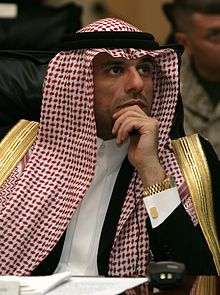Ali Hatem al-Suleiman
| Ali Hatem al-Suleiman | |
|---|---|
 | |
| Native name | علي حاتم السليمان |
| Born |
1971 (age 44–45) Baghdad |
| Occupation | Sunni tribal chief in Al-Anbar |
| Known for |
Sunni demonstrations in Ramadi - opposing the Shiite government "Anbar Awakening" - opposing al-Qaeda in Iraq |
| Religion | Sunni Islam |
Ali Hatem Abd al-Razzaq Ali al-Suleiman al-Assafi al-Dulaimi (Arabic: علي حاتم السليمان) (born 1971) is a Sunni sheikh in Anbar province. He is the former Emir of the Dulaim tribe, a position now held by his brother, Abdulrazzaq Hatem Abd al-Razzaq Ali al-Suleiman al-Assafi al-Dulaimi.[1]
Early life
Suleiman was born in Baghdad in 1971.[2] He is the former emir of the 3-million-strong Dulaim tribe, the largest Arab tribe in Iraq. Its members are predominantly located in the western province of Anbar, but also in the western part of Baghdad and also spread over in the area between Salman Pak stretching south to Al Hillah and west to Ramadi and Fallujah and to the north Taji, Samarra and Mosul.[3]
Iraq War
Following the 2003 Invasion of Iraq Suleiman joined the Iraqi insurgency, his own tribe formed the nucleus of the resistance\insurgency against U.S. forces and Shiite government forces in Iraq due to the bombing of Fallujah and the targeting of the Sunnis in Baghdad. However, in 2006 he and his armed tribesmen turned against Al-Qaeda due to the often indiscriminate use of violence used by Al-Qaeda, as well as the fact that Al-Qaeda did not give enough respect to Anbar's sheikhs.[4] After leaving the insurgency Suleiman became an important figure in Anbar he formed local police forces of 60 thousand gunman from his tribe in Anbar.[4]
Suleiman formed a political party, National Front for the Salvation of Iraq, in 2008. It ran as part of the State of Law Coalition of Prime Minister Nour al-Maliki but quickly the disagreements appeared after the kidnapping 10 men from his tribe in Ar Rutba by of Karbala police, in response to the incident Suleiman threaten to declare the State of Anbar. Suleiman formed another party (Baariq Iraq). However, his political party was banned from participating in the elections in 2014.
After the withdrawal of U.S. troops the Shiite government forces started to arrest Dulaimi civilians and killed them in Anbar, Suleiman, his brother Sheikh Abdulrazzaq, and other sheikhs of the tribe set up weekly demonstrations in Ramadi in square of pride and dignity for one year demanded to release the Sunni detainees and to withdrawal the army from the cities of Anbar, the government responded by killing ali al-Alwani and kidnapping his brother Sunni MP Ahmed al-Alwani from the Dulaim tribe (Albo-alon clan), as a result the Dulaimis returned to the armed insurgency led by Suleiman.
Suleiman formed the Military Council of the tribal rebels in Al-Anbar, Suleiman announced in a statement that Sunni territories will not be part from Iraq under the Shiite rule. saying as representative of Sunnis we will go with the independent Sunni state solution.
2013–14 anti-government offensives

In 2013 and 2014, Suleiman was the leader of the Anbar Tribes Revolutionary Council, an anti-government militant group active in the ongoing Anbar clashes. Unlike some of the other groups active in anti-government activity, Suleiman's force does not advocate the overthrow of the Iraqi government, but instead is limited in ambition to defending Anbar from what it sees as aggression from the Iraqi central government.[5]
Suleiman has also been involved in the 2014 Northern Iraq offensive, and he claims that ISIS only constitutes 5-7% of the anti-government forces. He claims that the majority of fighters are from Iraq's Sunni tribes. Suleiman has also claimed that these tribal forces would be able to defeat ISIS, were the Maliki-run Iraqi government to withdraw government forces from North and North-Central Iraq.[6] However, Suleiman claimed that tribal forces would not fight ISIS until Maliki was removed from office and Sunnis are given their rights.[7]
See also
References
- ↑ Inoma, Ali (14 March 2014). "Anbar witnesses political divide amid ongoing clashes". Al-Monitor. Anbar, Iraq.
- ↑ Al-Anbar Awakening Vol II: Iraqi Perspectives, p.107
- ↑ http://www.aawsat.net/2014/06/article55333359
- 1 2 Manfredi, Federico (16 August 2010). "Iraq's Crooked Politicians: Talking With Sheik Ali Hatem, Leader of the Sunni Awakening Councils". The Huffington Post.
- ↑ Sowell, Kirk H. (15 January 2014). "Maliki's Anbar Blunder". Foreign Policy.
- ↑ Koplowitz, Howard (16 June 2014). "Iraq Crisis Update: ISIS Seizes Tal Afar Amid Conflicting Reports Of Clashes Near Baghdad [MAP]". International Business Times.
- ↑ Brown, Matt (16 June 2014). "Execution images underline Iraq's deepening crisis". Australian Broadcasting Corporation.
External links
| Wikimedia Commons has media related to Ali Hatem al-Suleiman. |